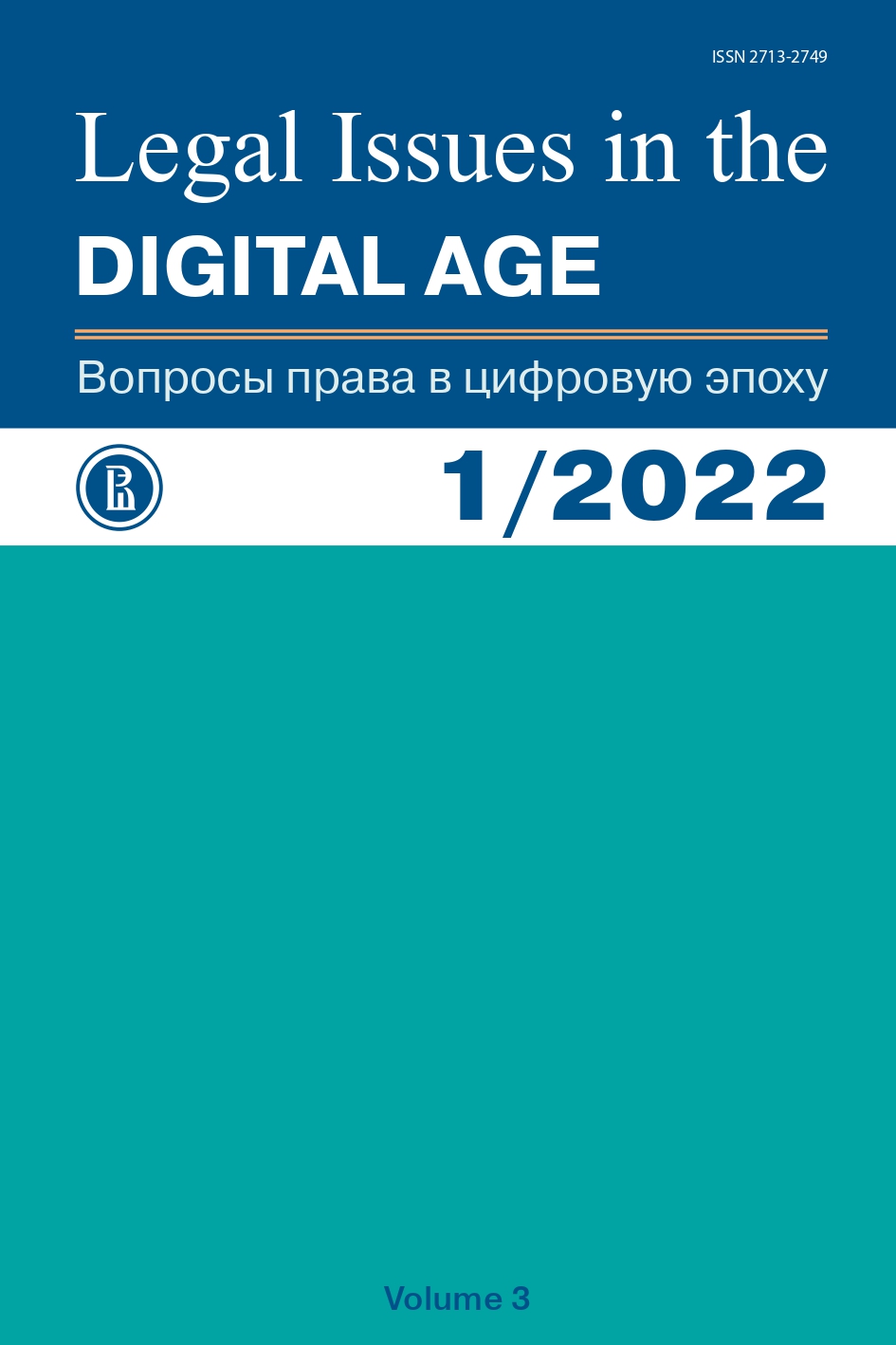Introducing and Developing Digital Technologies in Lawmaking: Legal Theory Aspects
Abstract
The article reviews current efforts to improve lawmaking which take place in a rapidly changing modern technological environment and are informed by the introduction of new information and digital technologies. On the one hand, the processes of digitization have an impact upon societal relations in all aspects of public life, leading to a fast growth of the volume of rulemaking. Law has an important role to play in the development of digital society and in the establishment of legal regimes necessary for the creation and development of modern technologies and for a functional business environment. On the other hand, the process itself of developing, adopting and putting laws into force changes and transforms under the impact of digital technologies. The author reviews practices of the application of IT technologies at different stages of lawmaking and examines the consequences, challenges and complexities of the introduction of digital tools. She pays special attention to the use of technologies of “digital rulemaking” by federal executive agencies in Russia and elsewhere and explores possibilities for improving them. The author also highlights the necessity to create a digital support for rulemaking, which would allow, inter alia, to automate the process of developing, and coordinating officially required cross-agency feedback for, drafts of laws/bylaws issued by the Government of the Russian Federation and federal executive agencies; the author argues that the electronic resources of the houses of the Federal Assembly should be connected to this system too. This would lay the foundation for creating a single integrated governmental system for developing and adopting laws/bylaws wherein all participants of lawmaking are connected with each other. The article reviews modern trends in developing and introducing digital services for lawmakers and technologies of machine readable law.
References
Arzamasov Yu. G. (2016) Problems of Doctrinal Interpretations of Law. Vestnik Rossiyskogo universiteta druzhby narodov. Seriya: Yuridicheskie nauki = RUDN Journal of Law, no. 12, pp. 9–25 (in Russ.)
Coglianese C. (2004) E-Rulemaking: Information Technology and the Regulatory Process. Regulatory Policy Program Working Paper RPP-2004-02. Cambridge (Mass.): Center for Business and Government, p. 78. DOI: https://doi.org/10.2139/ssrn.500122
Elmurzaeva R.A. (2013) Electronic Rulemaking As a Special Instrument of Governmental Policy: Capabilities and Limitations. Vestnik Tomskogo gosudarstvennogo universiteta. Ekonomika = Transactions of Tomsk State University. Economy, no. 2, pp. 56 –64 (in Russ.)
Farina C. (2014) Achieving the Potential: The Future of Federal e-Rulemaking: A Report to Congress and President. Cornell University. Available at: http://scholarship.law.cornell.edu/facpub/1237.
Germain C. (2010) Digitizing the World’s Laws. Working Paper. Cornell University. Available at: https://scholarship.law.cornell.edu/clsops_papers/72.
Golodnikova A.Ye., Yefremov A.A. et al. (2018) Russia’s Regulatory Policies: Main Tendencies and An Architecture of the Future. Moscow, p. 14 (in Russ.)
Khabrieva T. Ya., Chernogor N.N. (2017) Law in the Digital Reality. Zhurnal rossijskogo prava=Journal of Russian Law, no. 1, p. 86 (in Russ.)
Khabrieva T. Ya. (2018) Law and the Challenges of the Digital Reality. Zhurnal rossijskogo prava = Journal of Russian Law, no. 9, pp. 5–16 (in Russ.)
Kuchakov R., Saveliev D. (2018) Complexity of Legal Acts in Russia: A Lexical and Syntactic Quality of Texts. In: D. Skugarevsky (ed.) Analyses of Issues in Application of Law. Saint Petersburg: European University Press, 20 p. (in Russ.)
Moxley L. (2016) E-Rulemaking and Democracy. Administrative Law Review, vol. 68, no. 4, pp. 661–699.
Naumov V.B. (2018) Law in the Era of Digital Transformation: In Search of Solutions. Rossiyskoe pravo: obrazovanie, praktika, nauka = Russian Law: Education, Practice, Scholarship, no. 6, pp. 4–11 (in Russ.) 12. Polyakova T.A. (2020) Impact of the Digital Transformation on the Development of Information Law: Tendencies, Problems, Prospects. Monitoring pravoprimeneniya = Monitoring of the Application of Law, no. 2 (35), pp. 53–68 (in Russ.) DOI: https://doi.org/10.34076/2410-2709-2018-6
Rukavishnikova I.V. (2021) Non-use of Artificial Intelligence in Legal Monitoring Hampers Legislative Process. Parlamentskaya gazeta, June 24 (in Russ.)
Tikhomirov Yu. A., Nanba S.B., Gaunova Zh. A. (2019) A Legal Concept of Robotization. Moscow: Prospekt, p. 240 (in Russ.)
Tikhomirov Yu. A. (2009) The Theory of Law Code. Papers of the International Conference “Codification of Legislation: Theory, Practice, Techniques. Nizhny Novgorod, Sept. 25-26, 2008. Nizhny Novgorod: University Press, pp. 38–45 (in Russ.)
Saveliev A.I. (2020) Analysis of Complexity of Sentences in the Texts of Legal Acts of the Russian Federation. Pravo. Zhurnal Vysshey shkoly ekonomiki = Law. Journal of the Higher School of Economics, no. 1, pp. 50–74 (in Russ.)
Authors who publish with this journal agree to the Licensing, Copyright, Open Access and Repository Policy.










